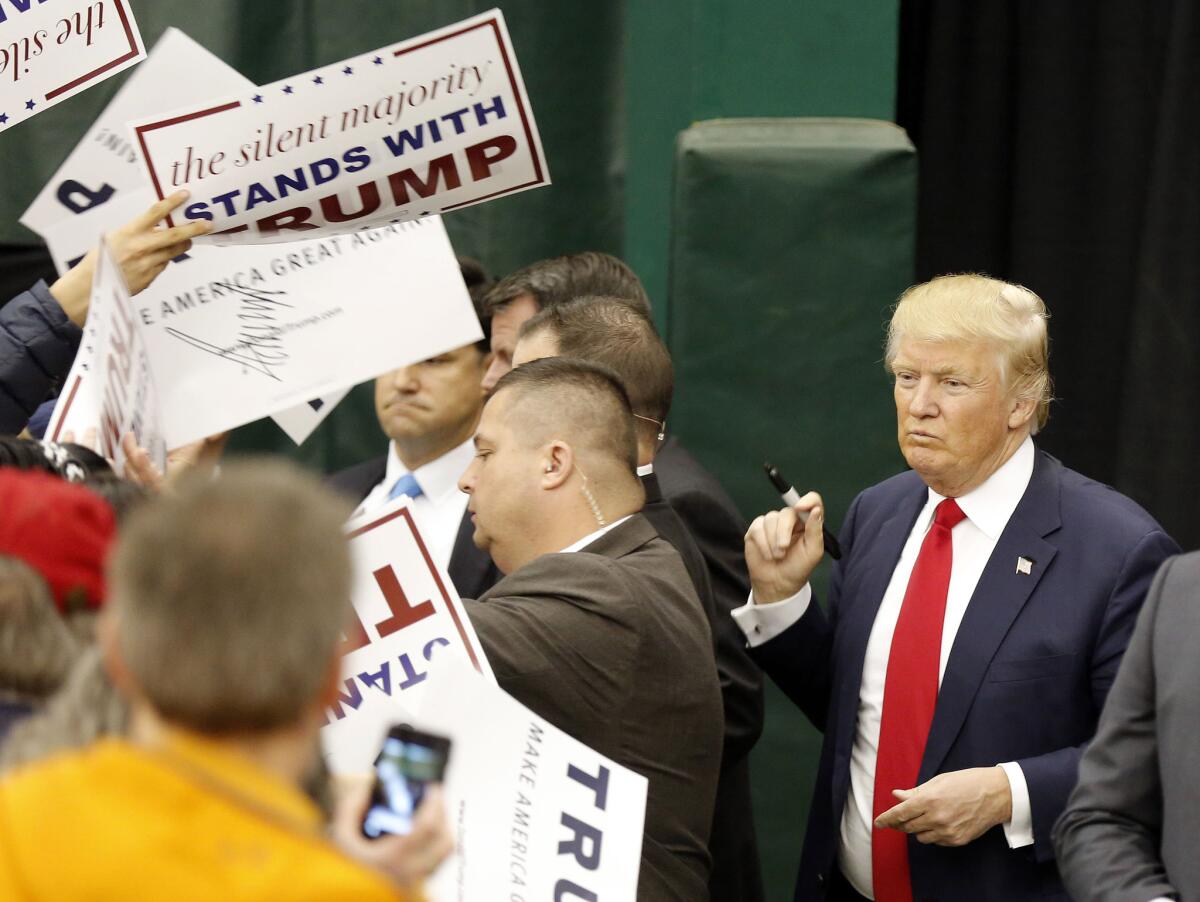Donald Trump deepens the divide between Republicans and voters overall

Supporters meet Republican presidential front-runner Donald Trump on Tuesday in Waterville Valley, N.H. His supporters appear solidly behind him despite criticisms.
- Share via
Reporting from Washington — The first measures of public opinion on Donald Trump’s proposal to ban most Muslims from entering the country underscore the fears of the GOP establishment: The idea gets strong support within Republican ranks but alienates much of the rest of the electorate.
The strongest evidence comes from a new NBC/Wall Street Journal poll, which finds that a plurality of Republican voters, 42%, said they support Trump’s plan, compared with 36% who oppose it.
By contrast, among voters overall, only 25% supported Trump’s idea, while 57% opposed it.
In the immediate aftermath of Trump’s announcement that he would call for a ban on most Muslims immigrating to or visiting the U.S., Republican congressional leaders and several of Trump’s rivals for the nomination were quick to reject the idea.
Since then, however, as evidence has accumulated that many Republican voters agree with the billionaire businessman, the chorus of criticism has grown muted. At his weekly news conference on Capitol Hill on Thursday, for example, House Speaker Paul D. Ryan of Wisconsin declined to repeat the criticism of Trump that he had voiced two days earlier.
“I weighed in on the comment made in the presidential campaign because I think that needed to be commented on, but I’m not going to spend every day here talking about the go-betweens of what’s happening in the presidential race,” Ryan said.
He repeated that he would support the party’s nominee, regardless of who wins the nomination.
Even before the comments about Muslims, Trump was a deeply polarizing figure in American politics. He has led the GOP field, nationally and in most polls of early-voting states, for months. In polls taken last weekend, he had the support of just over a third of GOP voters, with a CBS/New York Times survey released Thursday putting him at 35%.
Among voters at large, however, Trump is widely unpopular. The CBS/New York Times survey, for example, found that about 4 in 10 voters said they were afraid of what Trump might do if elected, while another quarter expressed concern.
Similarly, Gallup found in its most recent two-week tracking of public opinion that 32% of Americans had a favorable impression of Trump compared with 59% who had an unfavorable view. The two-week period ran through Monday, so it reflected almost entirely views from before Trump offered his proposal on Muslims.
By a significant margin, Trump had the most lopsidedly negative image of any of the major candidates. The next-most-negative rating for a Republican belonged to former Florida Gov. Jeb Bush, who was seen positively by 32% of those polled and negatively by 46%, Gallup found.
By comparison, Americans were almost evenly divided on former Secretary of State Hillary Clinton, the front-runner for the Democratic nomination, with 45% having a favorable impression of her and 49% a negative one.
The problem for Republican leaders who want to head off the possibility of Trump’s winning the party’s nomination is that his strongest supporters, who tend to be blue-collar Republicans and conservative independents, deeply mistrust the party’s establishment. When elected officials or media figures criticize Trump, that has tended to solidify his support among his backers.
Trump’s support appears far more solid in polls than backing for most of his rivals.
The intensity of many of Trump’s supporters could be seen at a focus group Wednesday night conducted by longtime GOP strategist Frank Luntz. When moderators showed the 29 people in the group ads that attacked Trump, their backing for him remained solid.
“Normally, if I did this for a campaign, I’d have destroyed the candidate by this point,” Luntz said after the session.
“He says some things that are off-color,” said one of the participants, Scott Mexic, a businessman from suburban Virginia. “But I still think he’s a leader.”
Staff writer Kurtis Lee is Los Angeles contributed to this article.
For more on politics and policy, follow @DavidLauter
More to Read
Get the L.A. Times Politics newsletter
Deeply reported insights into legislation, politics and policy from Sacramento, Washington and beyond. In your inbox twice per week.
You may occasionally receive promotional content from the Los Angeles Times.











